‘Doctor Who’ rewatch: Season four ranked
David Tennant and RTD say goodbye – for the first time
Welcome to Girl Culture, the newsletter where Caroline Siede examines pop culture, feminism, and more. Learn more about Girl Culture’s mission here
The most rewarding thing about this rewatch project has been seeing just how intentionally showrunner Russell T Davies built his character arcs across his original run of Doctor Who. Season one is about the Ninth Doctor healing from his Time War trauma with the help of Rose. Season two sees the Tenth Doctor in full puppy dog love mode. Season three is the Doctor in his grieving Fuck Boy era. And season four is where the Tenth Doctor finally grows up into someone more mature—but also someone more cynical too; more weighed down by the weight of the universe.
Fittingly, he finds the perfect foil in Donna Noble (Catherine Tate), who, for all her goofiness, is also perhaps the most mature companion of the modern era. While so many of the show’s female leads are young women just starting out in their adult lives, Donna feels like a grown-up. A messy, sometimes lost grown-up, sure, but also someone who knows herself, knows her values, and won’t suffer fools.
In fact, the whole show feels more grown-up in this final stretch of the Tennant/RTD era. The series hits the ground running with the confidence of a well-oiled machine and never really loses that energy, right on through to its final set of specials. And while there are times I found myself missing the scrappiness of the first three seasons, there’s no question that season four is the most consistent in quality of the Tennant era, bolstered by the truly phenomenal chemistry between its two leads.
That makes me incredibly excited for the reunion we’re about to get in the 60th anniversary specials. Tennant, Tate, and RTD are a pretty magical trio (quartet, if you include Bernard Cribbins’ Wilf). But before we get to their new outings, here’s how I’d rank their original run:
LOWER TIER
14. “The Next Doctor” (2008 Christmas special)
It’s kind of a shame that RTD used the Jackson Lake character here because on its own, I think the story of a Victorian man who mistakenly thinks he’s the Doctor could’ve made a really memorable, moving 42-minute episode of TV. Buried under all the CyberKing nonsense in this Christmas special, however, it just winds up feeling a bit lost. What initially promises to be an intriguingly lo-fi Victorian adventure somehow winds up as an overblown Kaiju battle. And tying that Kaiju battle into a rather confusing villain storyline about Victorian sexism doesn’t help either.
13. “The Sontaran Stratagem” / “The Poison Sky” (season four, episodes four and five)
As with season one, even this season’s weaker outings are still totally watchable. Here Martha Jones returns, UNIT enters the modern era, the Doctor and Wilf are properly introduced to one another, and the Sontarans make their NuWho debut. That’s almost enough to carry an adventure that probably didn’t need to be stretched across two episodes. As is so often the case in the RTD era, the present-day Earth setting doesn’t inspire much depth or creativity in the writing (and the dubious use of an “American” character doesn’t help either). But on the whole this anti-war parable is more underbaked than actively bad.
SOLID TIER
12. “Partners in Crime” (season four, episode one)
Bringing back a one-off guest star as a full-time companion allows this episode to have a different energy than NuWho’s previous season premieres. And though the Adipose storyline is pretty weak, the character-centric stuff in “Partners in Crime” is strong enough to make up for it. The pantomime scene alone makes this episode a comedic winner, topped only by that “want a mate/want to mate” moment. But there’s also more meaningful stuff here too: The Doctor owning up to his mistakes with Martha; the sweet dynamic between Donna and Wilf; the sense of melancholy behind Donna’s comedic exterior; that genuinely shocking Rose cameo. It’s a testament to just how strong this season is that this is one of its weaker episodes, and it still kicks things off with a bang.
11. “The Doctor’s Daughter” (season four, episode six)
This episode gave us the David/Georgia marriage—and therefore Georgia Tennant stealing the show in the third season of Staged. And for that alone, it’s a key text in the British TV canon. As an episode, it’s pretty solid too. Heavy handed in its themes and a bit over-the-top in its militarized dystopian worldbuilding. But, hey, that’s Doctor Who for you! Martha is arguably better served here than she ever was as a full-time companion, and the interrogation of the Doctor’s soldier/peacemaker dichotomy is interesting. It’s just tonally a little too all-over-the-place to truly qualify as one of the season’s best.
10. “Planet of the Dead” (2009 Easter special)
This episode usually turns up at the bottom of people’s season four rankings, but I actually think it’s pretty fun! Sure, it’s a bit silly and insubstantial, but given how heavy Tennant’s final run of episodes become, that makes for a welcome change of pace. Between the bus-of-people-trapped-on-an-alien-planet premise and the introduction of some memorable UNIT players, “Planet of the Dead” really showcases RTD’s knack for creating an ensemble of characters who all immediately pop. (And not just because one of them is played by future Oscar-winner Daniel Kaluuya.) And as Lady Christina de Souza, Michelle Ryan brings a fun, vampy energy that you wouldn’t necessarily want from a full-time companion but works well for a one-off adventure. Like “Voyage of the Damned” before it, I’m happy to enjoy this one as a heightened holiday romp.
9. “Planet of the Ood” (season four, episode three)
While the first three seasons of NuWho lived and died on interpersonal drama, season four gives the Doctor a solid partnership with Donna and mines its tension from more abstract concepts about morality. (It’s a bit Star Trek-y in that way.) And that’s especially true of this sci-fi parable, which rightfully interrogates the “happy slave” trope that’s long been an uncomfortable go-to for fantasy and sci-fi. It’s a concern that was briefly raised in the Ood’s introduction in season two, but takes center stage here as the Doctor and Donna discover just how the Ood’s “loyal” servitude actually operates. It’s a righteous (if maybe a bit simplistic) critique of the horrors of modern day capitalism. But the episode’s real grace note is Donna’s growth from someone overwhelmed by the Ood’s alienness to someone who, for lack of a better term, sees their inner humanity.
8. “The Stolen Earth” / “Journey’s End” (season four, episodes twelve and thirteen)
It’s always hard to rank an RTD finale extravaganza against a normal set of episodes, and that’s especially true of this one, which is full of stuff I love (mostly in “The Stolen Earth”) and stuff I find incredibly frustrating (mostly in “Journey’s End”). For as absolutely thrilling as it is to see all the Doctor’s friends and companions reunite for one massive Dalek adventure, the climax ultimately winds up feeling morally foggy and weirdly inert. Even worse, RTD takes what could be a really cool, complex idea with the Meta-Crisis Doctor and rushes through to a confused happy ending. Perhaps with three episodes instead of two, RTD could’ve made the resolution of this finale something special. But with so many characters and storylines to serve (including Donna’s devastating exit), it just feels like the individual moments don’t get enough room to breathe. Still, the initial Avengers-style team-up is undeniably amazing, and that counts for something.
7. “The Unicorn and the Wasp” (season four, episode seven)
Easily the best “celebrity historical” episode of the RTD era, “The Unicorn and the Wasp” benefits from a couple of different things. For one, the BBC does this kind of early 20th century setting better than just about anyone. And for another, the idea of a murder mystery starring Agatha Christie based on a real life mystery about her own life is pretty irresistible, particularly when this episode brings such comedic flair to the proceedings. Season four is the heaviest, most somber season of RTD’s run, and it’s a joy to have this delightful episode right smack dab in the middle of it—especially when Tennant and Tate are having this much fun. The only real misstep is how goofy that giant CGI bee looks, but I’ll happily take that in exchange for the hilarious kitchen charades scene.
6. “The Fires of Pompeii” (season four, episode two)
It’s pretty wild that Doctor Who delivered this absolute banger as just the second episode of the season—a sign of just how confident the show had become this far into RTD’s run. And it’s even more remarkable that such a morally complex episode starts with the premise, “What if Ancient Pompeii were a British family sitcom?” Ultimately, however, that goofiness gives way to a harrowing examination of the ethics of time travel—one that winds up reverberating across the series far longer than anyone expected (hi Peter Capaldi!). This is also the episode where it becomes clear that Catherine Tate isn’t just a great comedian, she’s a legitimately amazing dramatic actress as well. And that’s a huge boon for the season as a whole.
5. “Turn Left” (season four, episode eleven)
Apart from the weird Orientalism that kicks off the plot, this is an effectively eerie “what if” story about how precarious our lives can be—especially without the Doctor to solve all our problems. In fact, the depiction of how easily a thriving country can fall into a fascistic dystopia feels horrifyingly realistic. (Wilf’s “It’s happening again” is absolutely haunting.) Rose and Donna’s dynamic is also really touching, with Rose operating as a Doctor-like figure to this less confident, alt-universe version of Donna. Like so many of this season’s best episodes, it’s an incredible showcase for Tate. And it’s also a really effective thematic prime for the massive reunion to come in the season finale.
4. “The End of Time – Parts One and Two” (2009 Christmas special / 2010 New Year’s special)
The dumbest plot you’ve ever seen mixed with the most wrenching emotional pathos you can imagine? Why it must be an RTD season finale! Or series finale, in a way, as this is really a sendoff to an entire four-season era. As with “The Stolen Earth” / “Journey’s End,” this is a tricky two-parter to rank because one half is far superior to the other. But, thankfully, the stronger half comes second and that makes a world of difference. While pretty much everything about The Master’s return is a misfire (save for John Simm’s impressive commitment), positioning Wilf as the Doctor’s final companion is a true masterstroke. Ten is a Doctor defined by repression, yet Wilf’s openhearted emotionality seems to open him up like a raw nerve. That means Tennant gets to play notes of vulnerability we’ve never really seen from the Doctor before. And while, yes, a lot of this two-parter is defined by over-the-top melodrama, was Ten ever going to go out any other way? He’s a Doctor defined by melodrama—literally forged out of love for Rose Tyler only to lose her. “The End of Time” honors that side of his character while giving Tennant an emotional send-off worthy of his stellar tenure on the show.
TOP TIER
3. “The Waters of Mars” (2009 fall special)
For all its zippy sci-fi fun, one of the things that makes NuWho work is the sense that its all-powerful alien protagonist could snap at any minute; that the Doctor is only ever one bad day away from transforming from playful hero to vengeful god. And what makes “The Waters of Mars” so effective is that it puts us in the Doctor’s headspace to demonstrate just how hard it is to have that much power and responsibility resting on his shoulders at all times. In a normal episode, we’d root for the Doctor to break the rules and save all the lovely, brave scientists of Mars colony Bowie Base One. But here we understand that would mean crossing a line that can’t be uncrossed. It’s a subversive shift in perspective that elevates what would otherwise just be a creepy base-under-siege story into something truly unforgettable.
2. “Midnight” (season four, episode ten)
While RTD’s greatest strengths as a showrunner tended to lie in his big-picture character arcs and small-scale character scenes, he delivered some of his strongest individual episodes in season four. And that includes this all-timer, which proves necessity is the mother of invention. Though there are practical reasons for this episode’s contained setting, minimal special effects, and companion-lite structure, RTD turns those limitations into strengths with a truly terrifying chamber piece about what happens to the Doctor when he doesn’t have an everyday ally to make his Time Lord ego palatable. After four seasons spent celebrating the strength of the human spirit, “Midnight” acknowledges that in times of crisis and paranoia, sometimes people just become monsters. And the fact that RTD doesn’t really temper that dark thesis with a sense of catharsis makes this hour all the more haunting.
1. “Silence in the Library” / “Forest of the Dead” (season four, episodes eight and nine)
For all the fan debate about which showrunner did it best, there’s a strong case to be made that Doctor Who was never better than when Steven Moffat was writing under Russell T Davies. And this stellar two-parter is a fitting sendoff for that magic partnership. Part eerie sci-fi thriller, part tragic doomed romance, “Silence in the Library” / “Forest of the Dead” is the sort of boldly experimental episode that NuWho could only make four seasons into its run, with the confidence that its audience could follow both Donna’s abstract alt-universe subplot and the introduction of the Doctor’s out-of-sync love story with Alex Kingston’s Professor River Song. This two-parter is inventive, adventurous, deeply conceptual, and yet incredibly emotionally rich, and I’m not sure there’s any other episode in the RTD run quite like it.
You can also read my rankings of season one, season two, and season three
Coming soon on Girl Culture: I’m ending this Doctor Who rewatch project here (sorry and/or your welcome), and moving onto some rom-com writing for the holidays. But I’ll be reviewing the new Who specials over on Episodic Medium, if you need more Doctor Who content from me

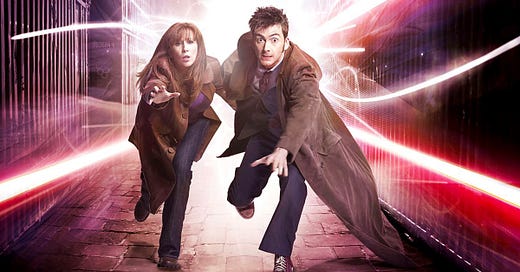



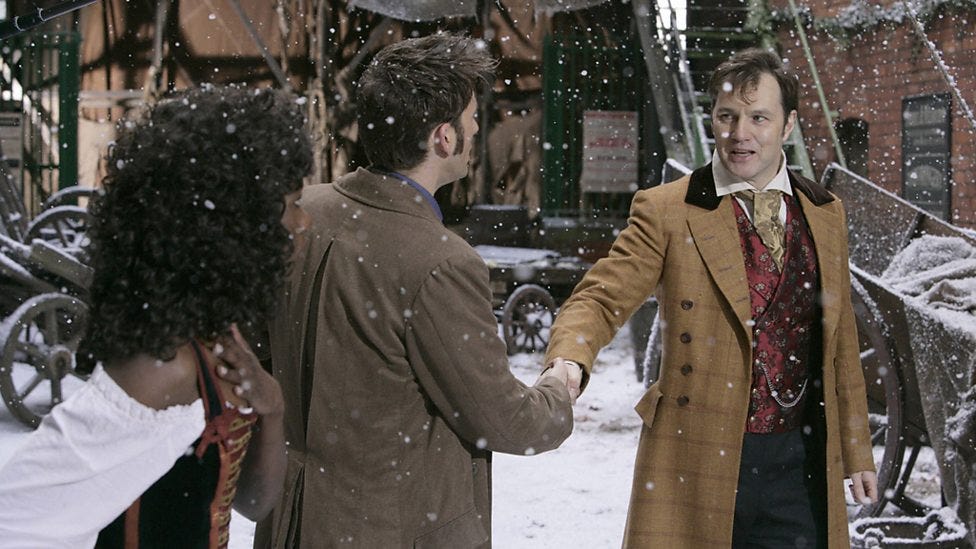
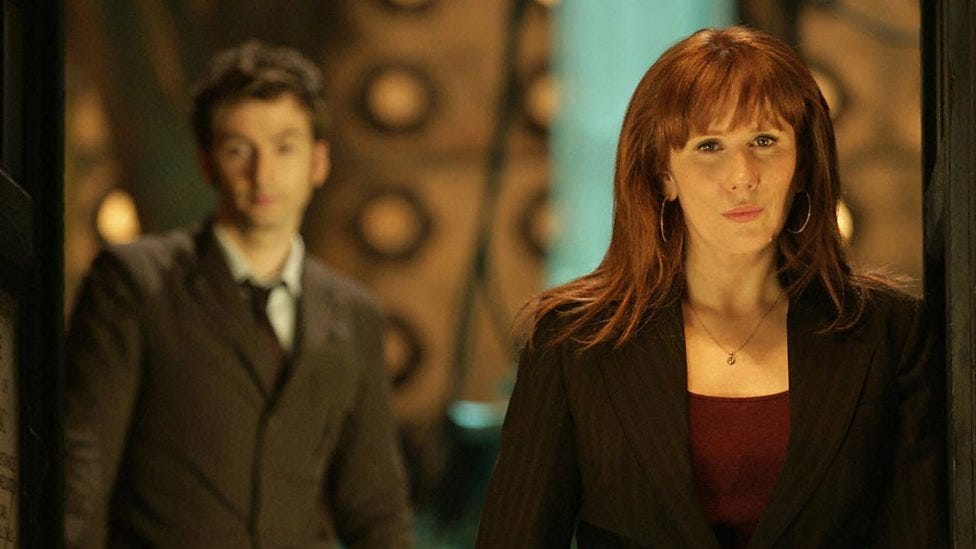
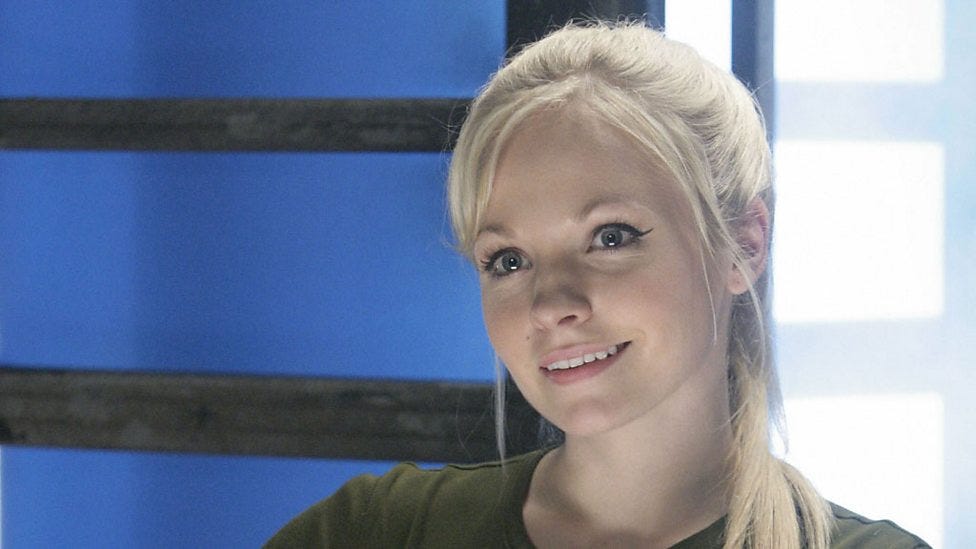
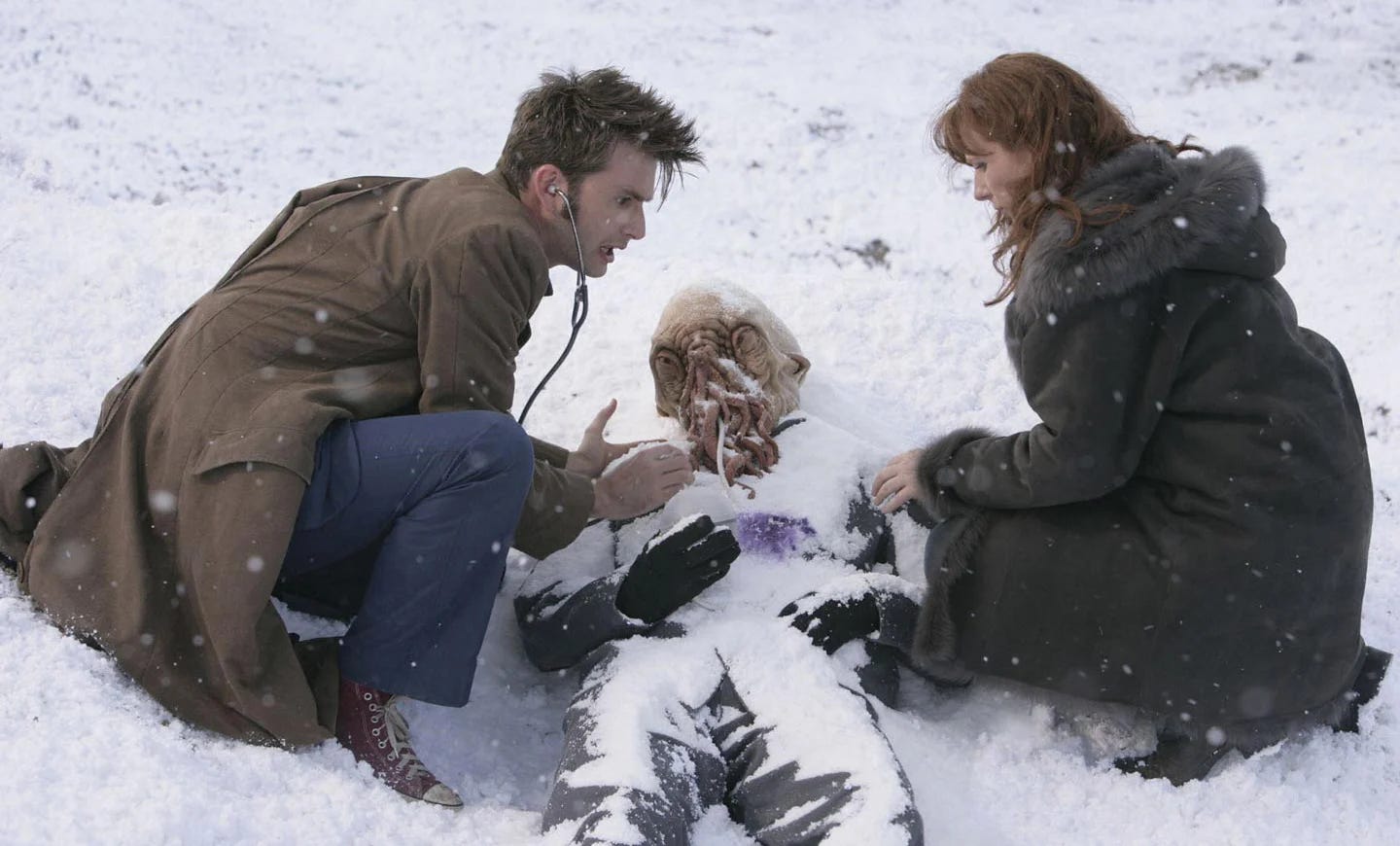

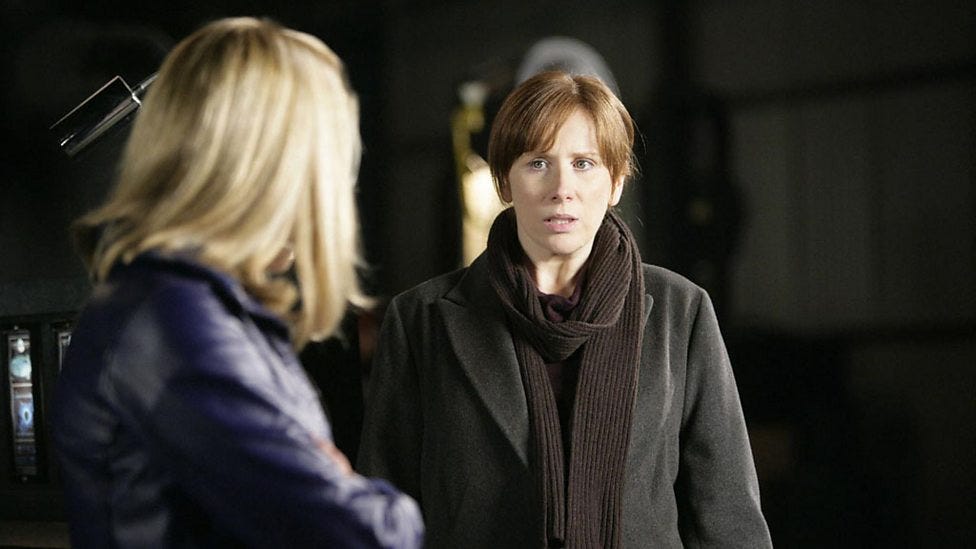
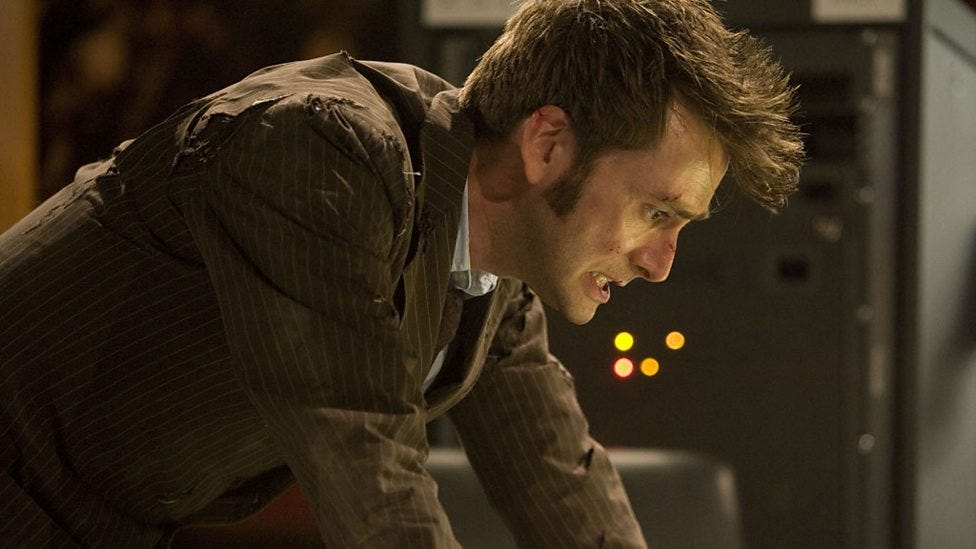
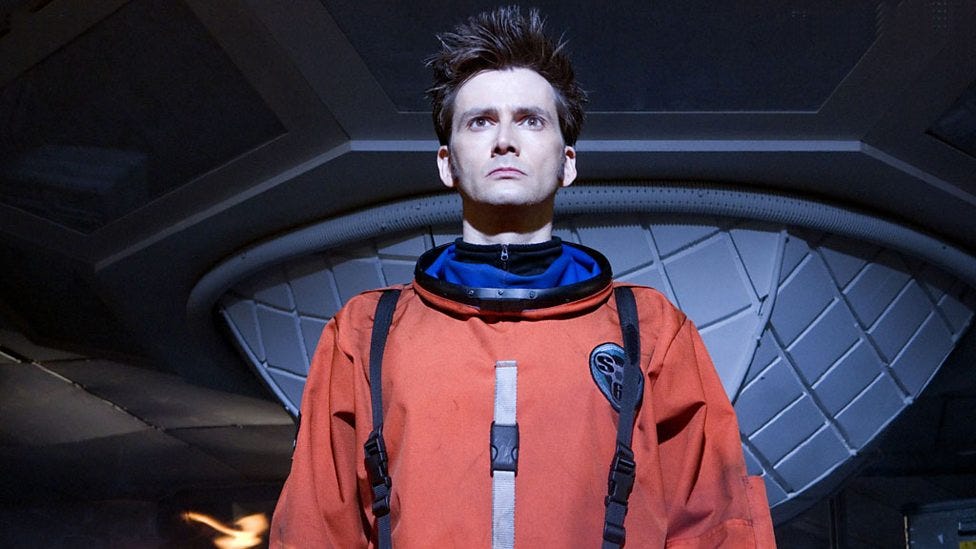
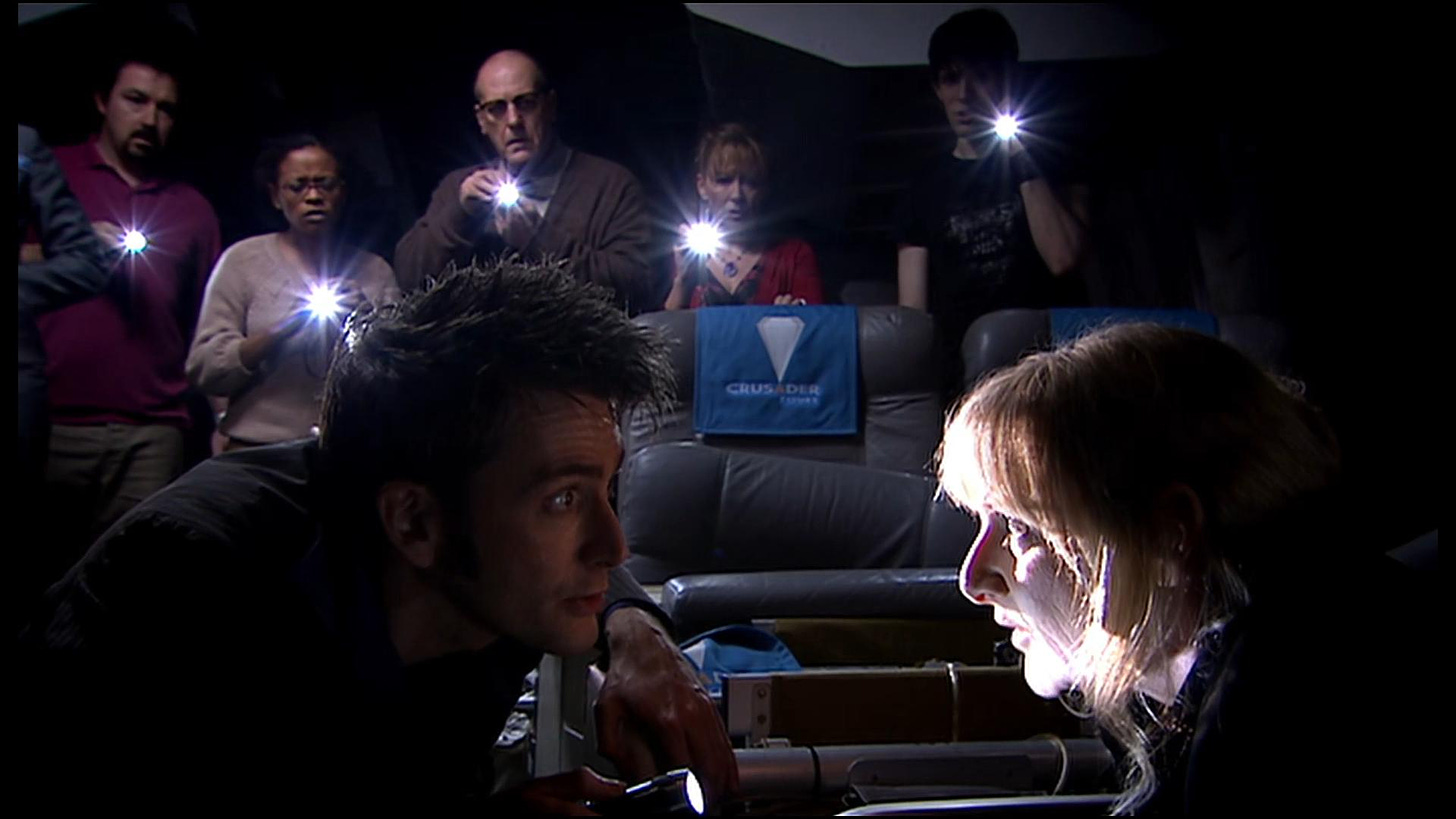
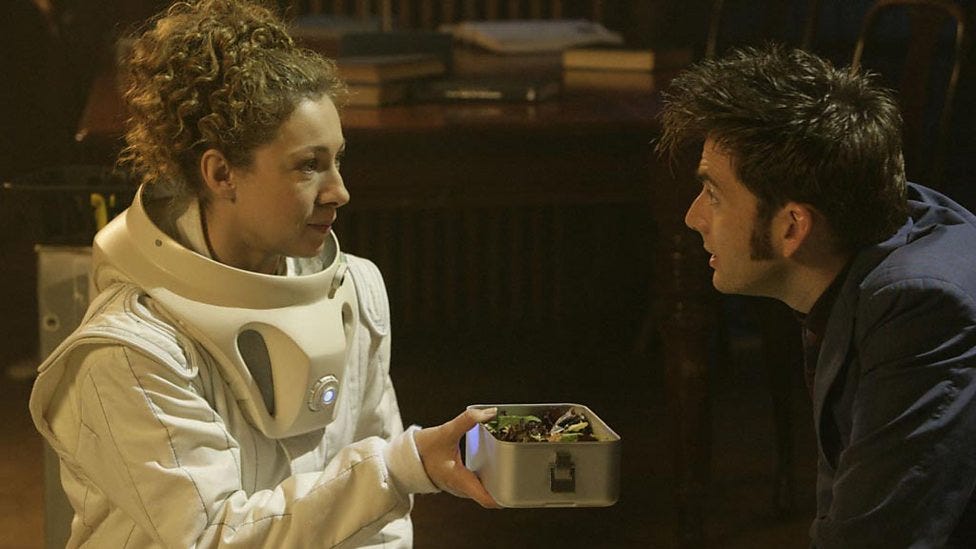
I was just thinking (admittedly at separate moments), "I need to rewatch my favorite Doctor Who episode--Silence In The Library/Forest of the Dead....I miss when the AV Club had writers I enjoyed...I miss hearing Caroline on Debating Doctor Who back in the day..." and then I came across this. Made my day!
Damn, you made me want to rewatch that season, as if I did not have too much to watch already! But a big shout out to the first appearance of River Song, as I am deeply in love with this out-of-sync story, even if it got messy towards the end/beginning 😁
And so glad to have you on Episodic Medium for the return of RTD. See you there!